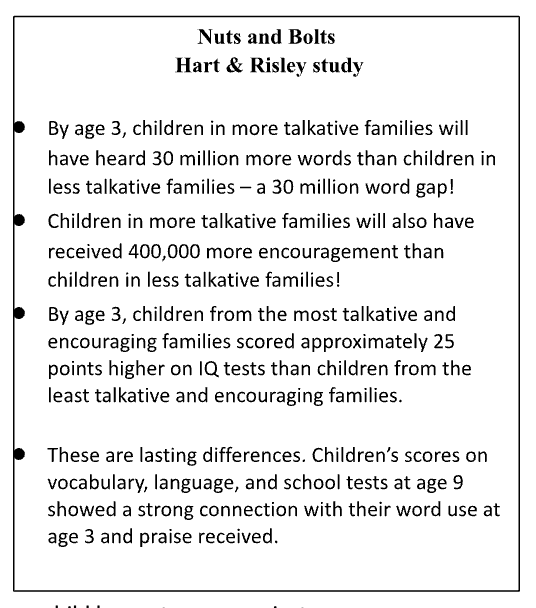A child’s brain develops most during the first years of life. Children’s experiences in the early years of life are pivotal for overall brain, language development, literacy readiness and many other skills linked to their future success in life (reading, making friends, staying in school, etc.). Among many indicators of success, vocabulary growth and knowledge, especially before the age of 3 years, come out as key predictors of a child’s success with reading and at school.
Chatty families = Chatty kiddos
A study by Hart & Risley (1995) found that by age 3, children in more talkative families will have heard 30 million more words than children in less talkative families – a 30 million word gap! What was even more surprising is the long-term impact on other developmental and academic success. Hart & Risley showed that the number of different words children hear by age 3 is directly related to how well they can read at age 9. Praise received also seem to play a role in the child’s future success. Take a look at the Nuts & Bots summary of that study.

Quantity and Quality matter!
As speech-language pathologists, we often recommend to parents to “talk to your child all day, in daily activities and every day”. Talk, talk some more and repeat – this is often our main strategy. While this is a reasonable recommendation, there is a caveat: it may not be the only factor impacting how a child learns to communicate.
While the quantity of words really makes a difference, the quality of the interaction plays a very important role in how a child grows their language skills. A study by Kathy Hirsh-Pasek and her colleagues (2015) found that the quality of interactions between parents and children also matters. It matters also as much as the number of words children hear. Children need to be equal participants in communication to thrive in social interactions and in conversations. This means that parents need to look at their child’s interests and then, follow the child’s lead when playing, talking and interacting. Meaningful interactions and conversations play an important role in growing a child’s language skills.
Make the most of everday interactions.
The quality and the quantity of the language we use with children matter. Both play a role in helping children develop their speech and language skills.
To give children the best possible start with language, in life and at school, parents, educators and anyone working and caring for young children should:
- Talk to your child often.
- Praise your child often.
- Listen actively.
- Read to your child every day.
Children’s early experiences have a big impact on their future ability to learn. If you are concerned about your child’s communication development, get help today. Recognizing speech and language problems early on is the best approach!
Check out our First Words Communication Checkup tool to know if your child is meeting communication milestones. Once you complete the screening, you can refer online. For more information, visit www.firstwords.ca or call Ottawa Public Health at (613) PARENTS.
Learn more:
Other references Hart, B. & Risley, T. (1995). Meaningful differences in the everyday experiences of young American children. Baltimore, MD: Paul H. Brooks. Hirsh-Pasek, K., Adamson, L. B., Bakerman, R., Tresch Owen, M., Michnick Golinkoff, R., Pace, A., Yust, P. K. S., & Suma, K. (2015). The Contribution of Early Communication Quality to Low-Income Children’s Language Success. Psychological Science, 26(7), 1071-1083. |


